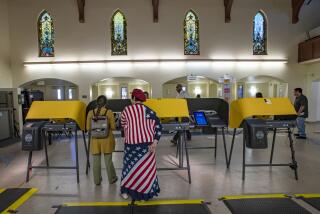Census Taker Gets Her Household, But It Isn’t Always Easy
ENCINITAS — The sun was setting as Ruth Zych climbed the wooden stairs of the dilapidated house near the beach. The porch slats creaked gently under her feet. A drawn curtain at one of the front windows twitched. Someone watching? Clutching her workbooks under one arm, she fished in her purse for her I.D. card and pressed the door bell.
And waited.
Would the person who answered be welcoming? Cooperative? Rude? Delightful? A psychopath?
“The first time I visit a sample household, I never know what kind of person will open the door,” Zych said. “I’m never given names. Only an address. And it has to be that address, not substitutes, because it’s been scientifically picked.”
Zych (it rhymes with “bike”) is a government census taker. A friendly, attractive grandmother in her 50s, she’s been asking people such personal questions as how much they earn and what they pay for their rent or mortgage for 22 years. Some are happy to be asked. Some are not.
Her territories have ranged from rural Kansas--where she usually left her interviews with gifts of homemade pies, eggs or fresh vegetables--to the Watts district of Angeles--where a typical parting message was, “Honey, honk when you’re safely back in your car. If you get safely back in your car.”
She lives, and works, now in San Diego’s North County.
“There are 22 of us working here,” she said. “Most people think censuses take place every 10 years. They are going on all the time: education, standard of living, employment. When you read in the papers things like ‘one-third of California’s younger generation is not completing high school,’ or ‘the number of black-owned businesses has increased 47% since 1980,’ those statistics come from our work.”
Each census, she said, helps to give the government a clearer picture of what’s going on.
Her experiences could make a TV situation comedy--”The Perils of Ruth.” She’s been bombarded with eggs, screamed at, bitten by a German shepherd and accused of being the front-runner for a gang of thieves.
“But mostly it’s fun,” she said. “You just have to keep a positive attitude.”
Some of her respondents--the ones who keep a record for the Department of Commerce of everything they spend money on--she sees every 3 months for 2 1/2 years.
“You get fond of them. One man paid me a wonderful compliment the other day. He said, ‘You’re as welcome in our home as our daughter.’ And then he added, ‘Even the dog cries when you leave.’ ”
Zych grew up in the small town of Salina, Kan., the only girl among three brothers. She was shy as a child. She didn’t like to talk to strangers. She was still shy when, as the 18-year-old “Miss Salina,” she went off to modeling school in Kansas City.
“It didn’t take me long to discover that you have to speak up or you get passed over for everything,” she said.
After three years of modeling for a coat and suit manufacturer, she married Karl Zych, who was in Army intelligence. “Just in time to get pregnant before he left for the Korean War,” she recalled.
Her daughter was 13, her son 10, when, in 1963, she passed the census-takers test at the Kansas City Federal Building.
The sample households assigned to her then were in Missouri and Kansas.
“I loved doing interviews in the small towns,” she said. “They used to announce on the radio that Ruth Zych would be in the area doing a census--small-town radio stations don’t have that much news--and when I turned up I’d often be greeted like a celebrity. I remember one dear old lady opening the door and yelling, ‘Poppa! Poppa! It’s that Ruth!’ ”
In the Midwest, particularly in the Bible Belt, she said, she found people very patriotic.
“At least they were then--in the ‘60s. They seemed glad of the chance to do something for their government. Sometimes, here in California, I’m greeted on the doorstep with ‘What does the blankety-blank government want from me now?’ ”
She was made a supervisor in 1972, with seven interviewers under her. “It was a lot more money,” she said. “But not nearly as much fun. I missed having something different happening all the time.”
Because of injuries suffered during the Vietnam War, Karl Zych retired from Army intelligence in 1977. He and Ruth moved to Southern California that same year. Her job, of course, was transferable to any part of the country.
“I called the regional office in Los Angeles and told them that I’d rather be an interviewer than a supervisor,” she said. “There was a long silence on the other end of the phone. Then a voice said, ‘We’ve never had anyone asking to be demoted before!’ ”
Although she enjoys her job as much as ever, Zych said that changing times have complicated it. In many households now, everyone in the family is at work all day. When she does find people at home, they are often suspicious of her motives.
“I send a letter, in an official envelope, about a week before I show up. But lots of people mistake it for junk mail and toss it out. I hear all the time, ‘Letter? What letter?’ ”
Foreign-born householders, she says, are sometimes frightened by her government ID card.
“I try to be reassuring, to convince them that I’m not looking for illegal aliens, only for statistics,” she said. “I was in a house in Vista a few weeks ago. There were 10 cots all around the living room. Clothes hanging everywhere. And this poor man sat there and told me ‘Two people live here. Only two people.’ I had the feeling that they’d all fled out of the back door as I was coming up the path.”
She always carries a list of translators in her purse. “Karl speaks Polish and Vietnamese, and I’ve taken him along as a translator--although it’s a bit hard to get him to come if it’s the middle of the football season. The easiest way is to find a child in the family who speaks English, and slip them a dollar.”
When her own children were still at home, Zych worked one week out of each month. Now she’s up to about 30 hours a week.
“One of the joys of this job is that you can pick your own hours, shuffle them around. We get paid by the hour right from the time we leave home--which is just as well because my territory includes Ramon and Julian. The Toyota I bought four years ago has 75,000 miles on it already.”
She returns to a house if nobody is home, or if she doesn’t get the information she needs. She leaves notes on the door. She persists. There’s a warmth to her personality, a cozy quality that usually wins over the reluctant ones. She inspires confidences about such things as gall bladder operations. People give her recipes. They tell her about their financial troubles.
“One woman in Spring Valley even demonstrated how she keeps her bust firm by exercising with large soup cans,” Zych said. “I learn something new all the time! And most of our respondents are really good-natured about participating in a census.”
But not always.
“I have had doors slammed in my face so hard I could hear pictures falling off the walls,” she said. “But I keep trying.” If that particular address is what the government wants, that particular address is what the government gets. To change it, Zych said, would bias the entire survey.
One household that required her to do a lot of persisting was an author’s in Leucadia.
“He was such a nice man. And such a tough nut to crack! His house had those smoky-colored, no-glare windows, but I could still see him inside, working at his desk, while I was ringing the doorbell. I rang again. I knocked. He just wouldn’t answer.
“Finally--and I think this was about my sixth visit--he gave up and opened the door. ‘I am sorry,’ he said. ‘I thought you were my ex-wife.’ ”
Has she ever given up on a household? Refused to go back?
“Not really,” she said. “Well . . . there was that place in Kansas City.”
It was a foggy November afternoon when she went there. It was dark inside, with every drape drawn and no lights except for the flickering living room TV. The place seemed to be occupied by half-a-dozen men, all silently watching the TV, and another man, the householder, who was in bed swathed in bandages.
“He didn’t want to tell me why he was in bandages,” she said. “I interviewed him in the bedroom, peering through the gloom. The whole set-up seemed so mysterious.”
She was outside, heading for the street again, when she realized she’d forgotten to get the man’s social security number.
“I looked back over my shoulder, at those drawn drapes, and I thought, well, just for once the government could do without that number.”










